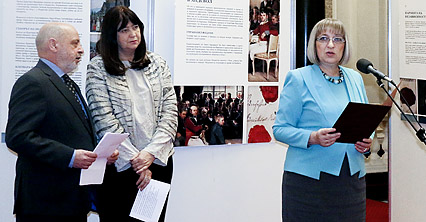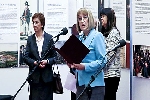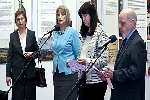
The National Assembly President Tsetska Tsacheva has opened in the parliament, on 12 December 2014, an exhibition dedicated to the 200th anniversary of the oldest Constitution in Europe still in force, the one of Norway. The exposition curated with the participation of the Storting (Parliament of the Kingdom of Norway) presents in a compact and perspicuous way the events of the distant 1814.
The historic coincidences and parallels give us ground to take note of the lessons given by history, stated the National Assembly President Tsetska Tsacheva at the opening of the exhibition titled: “1814 – Momentous Year”. She also noted this was the 135th year since the adoption of the Tarnovo Constitution and added that although different the history of Norway and the fight of Norwegian people for an independent and democratic state – as was in our country – passes through the adoption of a Constitution in which were laid down the most important principles and ideals of democracy. In her words, the Norwegian Constitution of 1814 and the Tarnovo Constitution of 1879 were considered in the past, not by accident, the most democratic ones. " The exposition tells the story of the fight of the Norwegian people for national freedom and while reading about the memorable for Norway year, 1814 , we could think again about the meaning of the inscription on Bulgaria’s Parliament – “Unity makes the strength”, Tsetska Tsacheva added.
The Ambassador of the Kingdom of Norway, Her Excellency Guro Katharina H. Vikør, expressed satisfaction that the exhibition, dedicated to the historic for Norway year 1814, when its Constitution had been passed, is presented at the National Assembly of Bulgaria at the same year when the latter marks the 135th anniversary of adoption of its first Constitution, a constitution so valuable for Bulgaria as ours for Norway. She stressed both constitutions lay down the path to democratic government.
Later on, H. E. Guro Katharina H. Vikør delivered at the National Assembly lecture before Law and Political Sciences students of the New Bulgaria University titled:” Constitution, Democracy and Rule of Law”.
In 1814 Norway introduces a parliamentary form of government and the King loses the right to appoint the latter, although officially this form of government is written down in the Constitution not earlier but in 2007. Nor the law for local self-government, passed at 1837, nor the introduction of a parliamentary form of government had led to revisions of the constitution.

- 22/04/2021
The Parliament imposed a moratorium on concessions, real estate deals and appointments pending the election of a new cabinet or caretaker government - 16/04/2021
By 156 votes “in favour”, the National Assembly accepted the resignation of the Council of Ministers with Prime Minister Boyko Borisov - 15/04/2021
Speech by Mrs. Iva Miteva upon her election as a President of the 45th National Assembly - 15/04/2021
The Member of Parliament Iva Miteva was elected President of the 45th National Assembly - 15/04/2021
The Members of the 45th National Assembly were officially sworn in - 03/03/2021
The President of the National Assembly Tsveta Karayancheva and MPs attended the solemn fireworks-retreat on the occasion of the Liberation of Bulgaria - 03/03/2021
Every Bulgarian should preserve and honour the memory of those glorious ancestors, thanks to whom Bulgaria exists today, said the President of the National Assembly Tsveta Karayancheva in Gabrovo - 03/03/2021
Today we are on Shipka to pay our respects to all the heroes who sacrificed their lives for freedom, said the President of the National Assembly Tsveta Karayancheva after climbing Shipka Peak together with young people from all over the country - 02/03/2021
The Vice-President of the National Assembly Valeri Simeonov received an award from the Bulgarian Republican Self-Government in Hungary - 26/02/2021
The Parliament adopted at second reading amendments to the Measures Against Money Laundering Act
 Български
Български English
English


